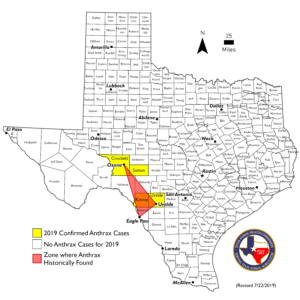Source: AgriLife TODAY | July 23, 2019
The Texas A&M Veterinary Medical Diagnostic Laboratory (TVMDL) plays a vital role in animal disease surveillance efforts, including anthrax. On average, TVMDL diagnoses two to three positive cases of anthrax annually in summer months. Thus far in 2019, the agency has confirmed 10 positive cases in several species, including exotic antelope, goats, horses, white-tailed deer and cattle. All positive cases have come from a Texas region with a historical presence of anthrax.
“Detection of this summer’s increased number of anthrax cases is just one example of the on-going role TVMDL plays in protecting animal health, human health, a safe food supply and the financial well-being of the second largest part of the Texas economy,” said Dr. Bruce Akey, director, TVMDL.

Anthrax, caused by Bacillus anthracis, is a spore-forming bacterium that is naturally occurring in soil in certain parts of Texas and around the world. As the veterinary diagnostic laboratory for Texas, TVMDL conducts thousands of surveillance tests each year for the early detection of high-consequence diseases that could have a devastating impact on the state’s livestock and poultry industries.
Bacillus anthracis spores can lie dormant in soil for several years, even decades. Typically, the bacterium infects grazing animals through ingestion of contaminated soil. Animals may also be exposed to anthrax through inhalation and through the skin; however, those are less common routes of transmission.
Anthrax is on the federal list of potential bioterrorism agents and is a zoonotic disease – a disease that can also infect humans. Therefore, anyone handling animals suspected of exposure to anthrax should take necessary precautions, such as wearing long sleeves and gloves.
How Texas A&M Veterinary Medical Diagnostic Lab helps identify anthrax
Once a suspected anthrax specimen arrives at the laboratory, TVMDL’s microbiologists obtain a pure bacteriological sample. This process is called isolation. After isolation, microbiologists identify diseases, like Bacillus anthracis, on the basis of physical characteristics of the bacteria itself and how it grows on culture plates. Following metformin-online, TVMDL’s microbiologists use additional specific tests to confirm the identity of the bacteria.
Working together, against anthrax
When it comes to identifying, tracking and stopping the spread of diseases like anthrax, TVMDL is one of many partners working together to protect Texas livestock. In accordance with state and federal regulations, TVMDL must report certain high-consequence diseases to various regulatory agencies, such as the Texas Animal Health Commission, the Department of State Health Services and, in the case of a potential bioterrorism agent like anthrax, the U.S. Centers for Disease Control and Prevention and the U.S. Department of Agriculture, as well. Once reported, regulatory agencies work with affected parties to control the spread of the disease.
Anthrax in livestock and wildlife
Clinical signs of anthrax in cattle, sheep, goats and deer may include fever, disorientation, labored breathing, muscle tremors, congested mucous membranes and collapse. It is possible for sudden death to occur without the presence of clinical signs. An animal can appear healthy and be dead within a matter of a few hours. In addition to the above clinical signs, horses may show signs of colic, enteritis and swelling of the neck and lower abdomen.
TVMDL encourages animal owners who have an interest in testing for anthrax to first contact a private veterinarian who can assist with evaluating suspect animals and the proper collection of samples. Once testing has been conducted, a TVMDL veterinary diagnostician can consult with private veterinarians and animal owners on additional testing and sampling requirements.
Texas A&M Veterinary Medical Diagnostic Lab’s role in protecting Texas
In addition to anthrax surveillance testing, TVMDL offers over 700 tests for a variety of diseases and conditions from clients across Texas, the United States and other countries.
For more information on anthrax and other TVMDL test offerings, visit tvmdl.tamu.edu or call our College Station laboratory at 1-888-646-5623 or our Amarillo laboratory at 1-888-646-5624. To learn more about precautions when handling suspected anthrax samples and disposal of anthrax-infected carcasses, visit the Department of State Health Services website at www.dshs.state.tx.us.
